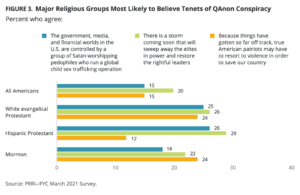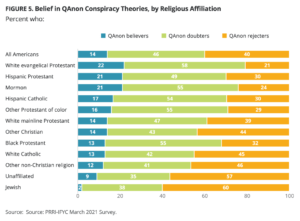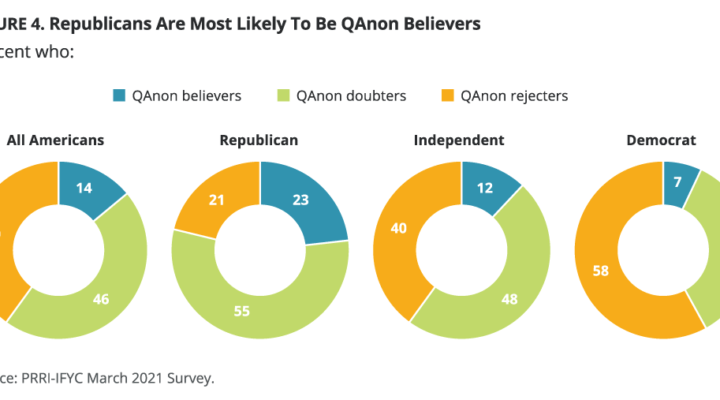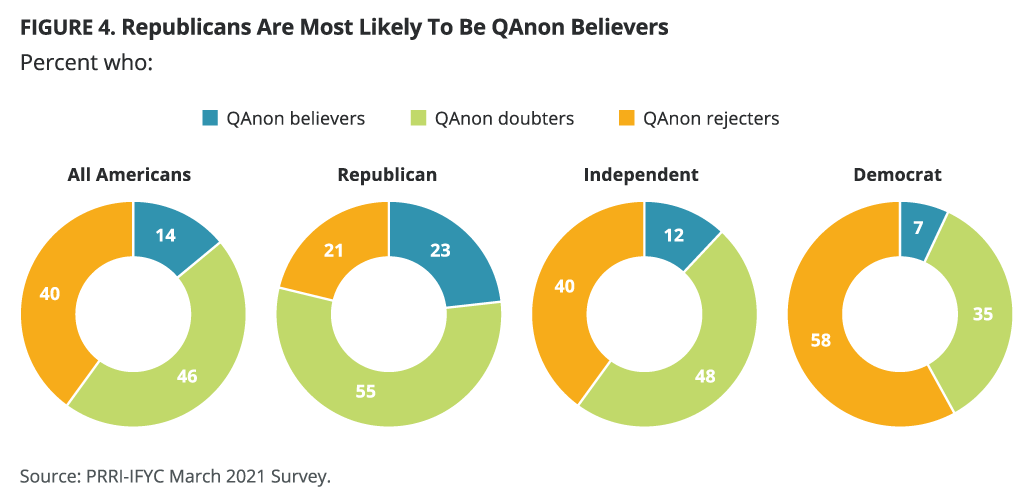“Media news consumption is by far the strongest independent predictor of QAnon beliefs,” says Public Religion Research Institute in explaining its latest research into the dominant conspiracy theory network of our day.
And not far behind media consumption are political affiliation and religious belief, the March 2021 polling found.
PRRI took a deep dive into who’s following the QAnon movement by testing agreement with three key tenets espoused by the loosely organized online network that persists despite fact-checking or other documentation of its falsehoods.
Christian pastors across America have reported the QAnon phenomenon is creating division in their congregations, communities and families.
The movement also has been described as a “big tent conspiracy theory that involves a constantly evolving web of schemes.
QAnon is a cluster of far-right conspiracy theories that emerged on the internet in late 2017 and was embraced by former President Donald Trump and some of his most vocal followers. One core theory revolves around Satan-worshipping pedophiles plotting against Trump and a coming “storm” that would clear out those evil forces. Several predictions of specific dates when President Joe Biden would be overthrown and Trump restored to office have gone unfulfilled.
As PRRI notes, though, the movement also has been described as a “big tent conspiracy theory that involves a constantly evolving web of schemes about politicians, celebrities, bankers and the media, as well as echoes of older movements within Christianity, such as Gnosticism.” Thus, QAnon believers are more prone than the general population to embrace conspiracy theories of all kinds.
Model of a QAnon believer
One result of the latest research is creation of a model that takes into account several variables of belief and demographics to identify the most common follower of QAnon.
 “Even after controlling for partisanship and ideology, media news consumption is by far the strongest independent predictor of QAnon beliefs,” PRRI reported. And, “those who report most trusting far-right media sources are nearly nine times more likely to be QAnon believers compared to those who most trust broadcast networks such as ABC, CBS and NBC. Those who most trust Fox News and those who do not watch television news are 2.3 and 2.5 times, respectively, more likely than those who watch broadcast networks to be QAnon believers.”
“Even after controlling for partisanship and ideology, media news consumption is by far the strongest independent predictor of QAnon beliefs,” PRRI reported. And, “those who report most trusting far-right media sources are nearly nine times more likely to be QAnon believers compared to those who most trust broadcast networks such as ABC, CBS and NBC. Those who most trust Fox News and those who do not watch television news are 2.3 and 2.5 times, respectively, more likely than those who watch broadcast networks to be QAnon believers.”
Nationwide, Americans are most likely to say the television news sources they trust most for accurate information are the major broadcast networks such as ABC, CBS and NBC. That’s not the case for QAnon believers, though, who are more likely to trust far-right and fringe media outlets such as One America News Network and Newsmax.
Four in 10 Americans who say they most trust far-right news outlets such as One America News Network and Newsmax for television news agree with the statement that “the government, media and financial worlds in the U.S. are controlled by a group of Satan-worshipping pedophiles who run a global child sex trafficking operation.”
Although the national Fox News channel is considered a key disseminator of Trump-related viewpoints, even its influence pales in comparison to the newer, more right-wing news outlets. Only 18% of Americans who most trust Fox News agree with the statement about the cabal of pedophiles.
However, on a slightly less-inflammatory tenet of QAnon — “There is a storm coming soon that will sweep away the elites in power and restore the rightful leaders” — 34% of those who most trust Fox News agree. But still more (48%) of those who trust the far-right news outlets agree.
The most potentially violent ideal of QAnon tested by PRRI is the assertion, “Because things have gotten so far off track, true American patriots may have to resort to violence in order to save our country.” Among those who most trust the far-right news sources, more than four in 10 agree with this statement, while nearly three in 10 of the Fox News faithful agree.
Religion and QAnon
Regarding religion, the PRRI data pulls out one finding not previously highlighted in coverage of QAnon, which has been seen largely as a white evangelical phenomenon: Hispanic Catholics and Hispanic Protestants are about three times more likely than the religiously unaffiliated to be QAnon believers.
 Yet that’s a higher comparative rate of adherence than among white Catholics, white evangelical Protestants and white mainline Protestants — all of whom are nearly twice as likely as the religiously unaffiliated to be QAnon believers.
Yet that’s a higher comparative rate of adherence than among white Catholics, white evangelical Protestants and white mainline Protestants — all of whom are nearly twice as likely as the religiously unaffiliated to be QAnon believers.
Seen broadly, though, white evangelical Protestants, Hispanic Protestants, and Mormons are more likely than other groups to agree with each of the three tenets of the QAnon conspiracy movement tested by PRRI, which reports that 22% of white evangelical Protestants, 21% of Hispanic Protestants and 21% of Mormons are QAnon believers.
Religiously unaffiliated Americans (9%) and Jewish Americans (2%) are least likely to adhere to QAnon beliefs.
Politics and QAnon
Among other findings in the PRRI model: Republicans and conservatives are twice as likely as Democrats and liberals to be QAnon believers.
On the assertion about the Satan-worshiping pedophile cabal, for example, most Americans (82%) disagree. But Republicans (23%) are significantly more likely than independents (14%) and Democrats (8%) to agree.
Republicans and conservatives are twice as likely as Democrats and liberals to be QAnon believers.
QAnon and belief in other conspiracies
Those who follow QAnon also are more prone to believe other conspiracy theories, PRRI found.
For example, while 29% of all Americans (almost all of whom are Republicans) agree with the lie that the 2020 presidential election was stolen from Trump, 73% of QAnon believers say this is true.
Likewise, only 9% of Americans believe the COVID-19 vaccine contains a surveillance microchip that is the mark of the beast mentioned in some versions of biblical prophecy — also documented to be a lie — this figure jumps to 39% among QAnon believers.
Related articles:
Is QAnon a prophet or provocateur? And how should Christians respond?
‘How can I talk to my parent who has been consumed by Trumpism and QAnon?’
Why are Christians so susceptible to conspiracy?
Church in the age of conspiracy theories
Where do you go for news you can trust?
Half of pastors say their congregants are spreading conspiracy theories


